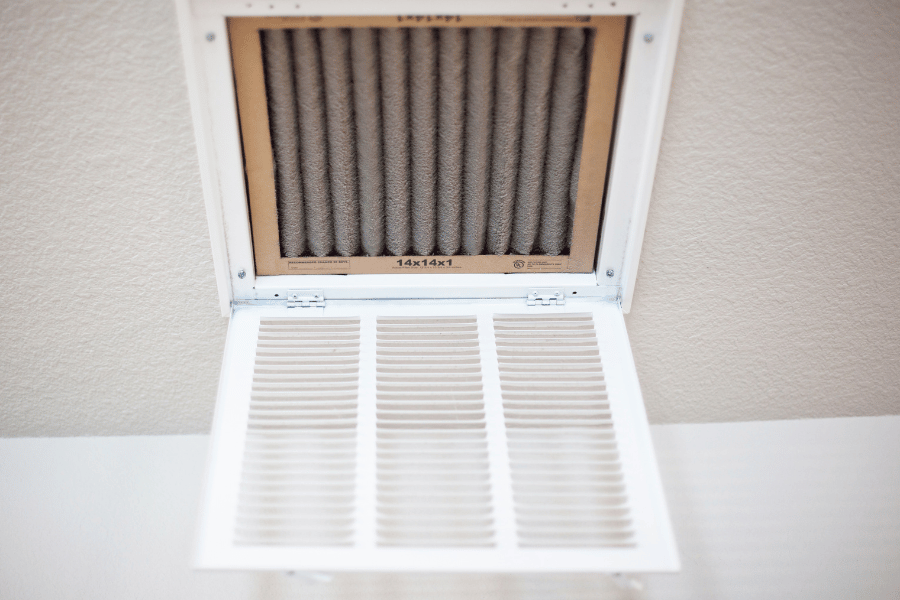Your HVAC system is one of the most crucial components of your home, responsible for maintaining a comfortable environment all year round.
Whether it’s battling the heat of summer or keeping you warm during chilly winters, your HVAC system works hard to ensure your home’s air quality and temperature remain ideal.
To keep it running smoothly, there’s one simple but essential maintenance task that often gets overlooked—replacing your HVAC filter.
In this post, we’ll cover why regularly replacing your HVAC filter is so important, how it impacts your home, and tips to help you stay on top of this critical maintenance step.

1. Improves Air Quality in Your Home
The primary function of an HVAC filter is to clean the air that circulates through your heating and cooling system. It traps dust, pollen, pet dander, and other airborne particles that can otherwise circulate throughout your home.
A clogged or dirty filter can no longer effectively capture these contaminants, which means they are released back into the air. Over time, poor air quality can exacerbate allergies and asthma symptoms, and even lead to respiratory issues for people with sensitivities.
Replacing your HVAC filter regularly helps maintain clean indoor air, which is especially important for homes with young children, pets, or family members who suffer from allergies or respiratory conditions. Clean filters ensure that the air you breathe is as free from harmful particles as possible.
2. Ensures Efficient HVAC System Performance
Your HVAC system works best when it can move air through your home without obstruction. When a filter becomes clogged with dirt and debris, it restricts airflow, forcing the system to work harder to push air through. This extra strain can lead to decreased efficiency and increase wear and tear on your system.
Replacing filters on a regular basis helps keep airflow smooth and efficient, which translates to less energy consumption and lower utility bills. Additionally, reducing the strain on your HVAC system can help prolong its lifespan, saving you from costly repairs or early replacement.
3. Reduces Energy Costs
If your HVAC system has to work harder due to a dirty filter, it naturally consumes more energy. This means higher energy bills each month. According to the U.S. Department of Energy, replacing a clogged filter with a clean one can lower your HVAC system’s energy consumption by 5% to 15%.
By staying consistent with filter replacements, you can help ensure that your heating and cooling system operates efficiently, resulting in noticeable savings on your energy costs.
4. Prevents Unnecessary HVAC Repairs
When airflow is restricted due to a dirty filter, your HVAC system must compensate by working harder. Over time, this can lead to parts of the system wearing out faster than they should.
A clogged filter can cause the blower motor to overheat, create pressure imbalances, or result in frozen evaporator coils—all of which can lead to expensive repairs.
Regularly replacing your filters helps prevent these issues by allowing your HVAC system to function as intended. This simple act of maintenance can save you from the headache of sudden breakdowns and costly repair bills.
5. Extends the Life of Your HVAC System
Replacing filters regularly isn’t just about improving efficiency or air quality—it also directly impacts the lifespan of your HVAC system. When your system is forced to work harder because of restricted airflow, it shortens its operational life. Overworked components, like the blower motor or compressor, are more likely to fail prematurely.
By keeping your HVAC filter clean, you allow the system to operate under less strain, which can help you avoid the expense of replacing the entire system sooner than necessary.
6. How Often Should You Replace Your HVAC Filter?
The frequency of filter replacement depends on several factors, including the type of filter you use, the size of your home, and whether you have pets or live in an area with high pollen counts. As a general rule:
- Standard filters should be replaced every 30 to 90 days.
- High-efficiency filters (such as HEPA filters) may last up to six months.
- If you have pets, allergies, or live in a dusty area, you may need to replace your filter more frequently.
It’s always a good idea to check your filter monthly to see if it’s visibly dirty and change it as needed.
Final Thoughts
Replacing your HVAC filter regularly is one of the simplest and most effective ways to maintain a healthy, comfortable home environment. Clean filters help ensure good air quality, improve system efficiency, reduce energy costs, and prevent unnecessary repairs.
By making this small maintenance task a priority, you can extend the life of your HVAC system and enjoy better performance year-round.
Don’t wait until a dirty filter causes problems—set a reminder to check and replace your filters regularly. It’s an easy step that brings big benefits to your home, your health, and your wallet.
If you are experiencing a problem with your air conditioning or heating call us at 512-336-1431 to schedule an appointment. We’ll be glad to come out and take a look at the issue.
1431-183 A/C & Heating proudly serves Round Rock, Georgetown, Cedar Park, Pflugerville, Leander, Liberty Hill, and North Austin.
